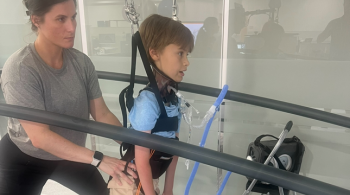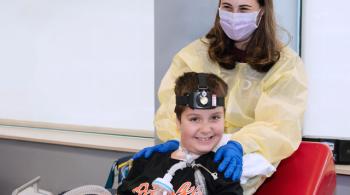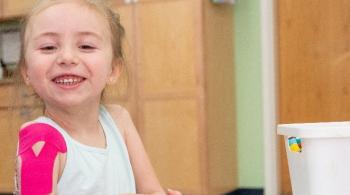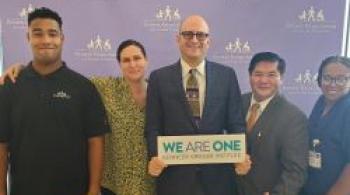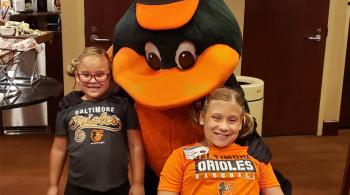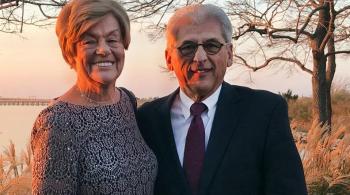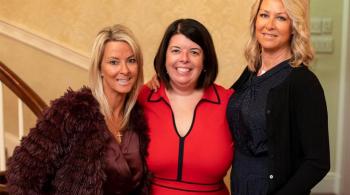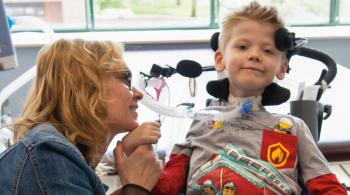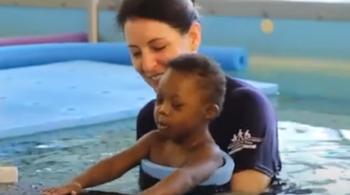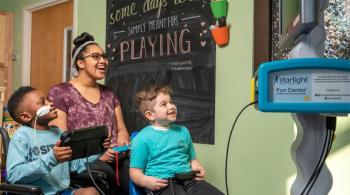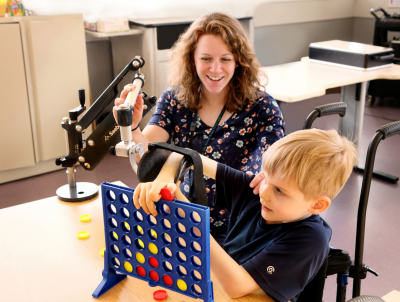 One of Kennedy Krieger’s newest donors took action to help his coworker’s son—and other children around the world.
One of Kennedy Krieger’s newest donors took action to help his coworker’s son—and other children around the world.
What would you do if you found out the young son of one of your coworkers had been diagnosed with a very serious, rare illness that few hospitals in the country—let alone the world—were equipped to treat?
For one gracious Kennedy Krieger Institute donor, the answer was simple: Step up to help ensure the child receives the best, most up-to-date medical care possible.
When this donor’s coworker first told him his son, Julian, had been diagnosed with acute flaccid myelitis (also known as AFM) last fall, “my immediate thought was that Julian could be any of us, and we needed to do what we could to minimize the impact of AFM—for Julian, and for all children,” the donor says.
AFM is a condition that damages the part of the spinal cord controlling movement, often paralyzing the arms and legs, particularly in the shoulders and hips. It does not affect sensation or cognition, and it does not always cause loss of movement in hands and feet, explains Janet Dean, a pediatric nurse practitioner for Kennedy Krieger’s International Center for Spinal Cord Injury.
The cause of AFM is not fully understood, although scientists think it is most likely the result of a viral infection. Cases of AFM have spiked every other year since 2014, and more than 90 percent of individuals with AFM are children, according to the Centers for Disease Control and Prevention. In the last five years, the number of patients admitted to Kennedy Krieger with a diagnosis of AFM has increased dramatically. In 2016, the Institute treated approximately 20 percent of all individuals diagnosed with AFM in the U.S.
“The Institute’s renowned expertise in treating disorders of the spinal cord and brain, its specialized pediatric inpatient rehabilitation hospital, and its experience in treating AFM make the Institute one of the best places in the world for rehabilitation following an AFM diagnosis,” says Dr. Bradley Schlaggar, Kennedy Krieger’s president and CEO.
“From the research Julian’s dad and I did,” explains the donor, who prefers to remain anonymous, “it seemed that Kennedy Krieger was probably the best place in the world for Julian, and at the forefront of research on AFM, this very mysterious disease we know so little about.”
After an initial hospitalization in New York City, Julian began inpatient rehabilitation at Kennedy Krieger, and he continues to receive treatment there today. But that’s not where this story ends. Julian’s dad’s coworker wanted so much to help Julian, and other children like him, get better that he decided to donate $100,000 to Kennedy Krieger to support the Institute’s AFM work—expanding services for children with AFM, further developing best practices for rehabilitation following an AFM diagnosis, and performing research to learn more about AFM.
“Investing in Kennedy Krieger will not only help Julian and others at Kennedy Krieger,” the donor says, “but also help other institutions around the world help other kids, too.”
For a child with AFM who requires a ventilator to breathe, inpatient rehabilitation can be costly, and can last an average of three months. That includes around-the-clock respiratory therapy, nursing and the use of ventilator equipment, Dr. Schlaggar explains.
“With the rise in the number of children being diagnosed with AFM, we’ve urgently needed to increase the number of ventilator beds and staff members necessary to take care of more severely affected children who need our services,” Dr. Schlaggar says. “This generous donation makes it possible for us to do so—we know that many children will benefit from this gift.”
Visit KennedyKrieger.org/AFM to learn more about AFM.

